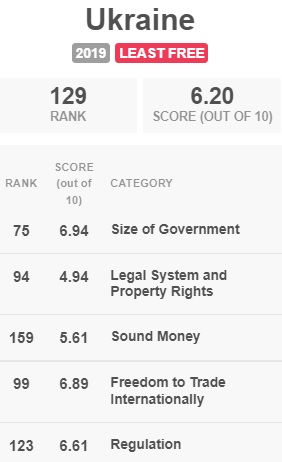By Dan Mitchell @ International Freedom
My Take - Let's make this point clear. Ukraine's government is stunningly corrupt, and that's the reason for their lagging behind countries like Poland. As for those who are jumping up and down insisting we print money we don't have to give to Ukraine: Where does it say America is responsible for the economic survival of the world's nations. Bretton Woods didn't even require that. So why are Americans expected to foot the bill for Ukraine's recovery? And what would be recovered? A stunningly corrupt government? As Dan says: This is flushing money down the toilet.
Regarding Russia's reprehensible attack on Ukraine, I've written three columns.
- Russian oligarchs don't deserve much sympathy because they got their riches through cronyism rather than capitalism.
- Western nations should weaken Putin by opening their doors to young and educated Russians who wish to emigrate.
- Russia is being hit by sanctions because of the long-standing recognition that trade restrictions weaken a country's economy.
Today, let's address the topic of foreign aid for Ukraine, specifically whether American taxpayers should help restore that country's economy once the conflict ends.
 I'll start by recycling an observation I made back in 2014, which is that Ukraine has been an economic laggard because of statist economic policies.
I'll start by recycling an observation I made back in 2014, which is that Ukraine has been an economic laggard because of statist economic policies.
More specifically, I compared Poland (which has engaged in substantial liberalization) and Ukraine (which has not) and showed a growing gap between the two nations (another case study for the anti-convergence club).
Now let's look at some updated data from the latest edition of Economic Freedom of the World.
 As you can see, Ukraine is a cesspool of statism, ranking a miserable #129 out of 165 jurisdictions.
As you can see, Ukraine is a cesspool of statism, ranking a miserable #129 out of 165 jurisdictions.
That's lower than Russia, which is #100.
And the same is true if you look at the latest edition of the Index of Economic Freedom, which ranks Ukraine #130 and Russia #113.
At the risk of stating the obvious, giving economic aid to Ukraine would be flushing money down the toilet.
Unless, of course, western nations such as the United States somehow made aid contingent on sweeping economic liberalization.
We know what works. Don Boudreaux, Deirdre McCloskey, and Dan Hannan have all explained how Western Europe and North America became rich in the 1800s and early 1900s with the tried-and-true approach of free markets and limited government.
Even a curmudgeonly libertarian like me would relax my long-standing hostility to aid under those conditions.
The odds of that happening, however, are slim to none. And I would put my money on none, as explained by the "Foreign Aid Paradox."
No comments:
Post a Comment